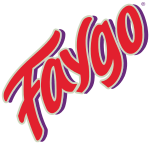Faygo
 | |
| Type | Carbonated soda |
|---|---|
| Manufacturer | National Beverage Corporation |
| Country of origin | Detroit, Michigan, United States |
| Introduced | 1907 |
| Website |
www |
Faygo Beverages, Inc., is a soft drink company headquartered in Detroit, Michigan. The beverages produced by the company, branded as Faygo or Faygo Pop, are distributed in the Midwest, Mid-Atlantic, and Central Southern regions of the United States, as well as southern Canada. Faygo is imported in Europe by American Fizz, an official distributor of Faygo. Faygo Beverages, Inc., is a wholly owned subsidiary of the National Beverage Corporation, started in Detroit, Michigan, in 1907 as Feigenson Brothers Bottling Works.[1]
History

The Feigenson brothers, who developed Faygo, were originally bakers from Russia. Faygo first became available in 1907 in bottles with only three flavors: grape, strawberry, and fruit punch. These flavors were based on the Feigenson brothers' cake-frosting recipes. They charged three cents for one bottle, and five cents for two bottles. The brothers bought their first delivery truck in 1922, and started home deliveries the following year. They also introduced a low-calorie version in the 1960s called Ohana. In the 1980s, they introduced flavored carbonated water.
In the 1920s as the company expanded, they thought the brand name "Feigenson Brothers" was too long and changed it to Faygo.[2] The brothers ran the company until the mid-1960s, when they turned it over to their sons.[1] In 1969, the company created a series of radio and television advertisements featuring a fictional cowboy called the Faygo Kid, who was portrayed in animation for television commercials for Faygo Old-Fashioned Root Beer.[1]
Because the drink had a limited shelf life, the company only sold its products in Michigan until the late 1950s. Company chemists later resolved this issue by installing a filtration system to remove impurities from the manufacturing plant's water system.[1] In the 1960s, the soda's regional popularity expanded when the company began advertising during broadcasts of Detroit Tigers games.[1] Commercials produced in the 1970s featured "everyday people" on a Mexican ferry widely but wrongly thought to be the Boblo Boat singing the "Faygo Boat Song".[1] Tree Sweet Products Corp. sold the company to National Beverage Corp. in 1987.[3] In 2007, Faygo celebrated its 100th anniversary.[1]
Reception
Faygo brands were praised in the September 2009 issue of Bon Appétit, ranking Faygo Root Beer as the best-tasting American root beer, describing it as "dry and crisp, with a frothy head, a good bite and a long finish".[4][5]
Detroit-based hip hop group Insane Clown Posse include references to Faygo in several of their songs.[6][7] Positive audience reaction to an early concert performance in which Violent J threw an open bottle at a row of hecklers resulted in the group continuing to spray their audiences with the drink.[7] They repeated this practice which developed into the Juggalo culture's "Faygo Showers".[8] This in turn was referenced in the webcomic Homestuck, in which a character loosely based on Juggalo subculture (Gamzee Makara) is shown drinking it multiple times.
Rapper 6 Dogs references Faygo in his song "Faygo Dreams."
Rapper Lil Xan makes a reference to Faygo in Diplo's 2018 release "Color Blind"
References
- 1 2 3 4 5 6 7 Smith, Joel (March 2, 2007). "Faygo celebrates 100th birthday". The Detroit News. Retrieved October 30, 2008.
- ↑ Anders, Melissa (April 28, 2013). "What's in a name? Here are the stories behind Biggby, Zingerman's, Founders, Faygo, Domino's". The Flint Journal. Retrieved April 28, 2013.
- ↑ "National Beverage Corp. Company History". Funding Universe Company Profiles. Funding Universe. Retrieved July 17, 2008.
- ↑ "root beer". Bon Appétit. 54 (9): 26. September 2009.
- ↑ Rector, Sylvia; Powers, Nancy Chipman (August 28, 2009). "What's going on: Faygo Root Beer ranked No. 1". Detroit Free Press. Archived from the original on July 2, 2013. Retrieved February 15, 2015.
- ↑ Dominic, Serene (October 29, 2008). "(Not) just a juggalo". Metro Times. Retrieved October 30, 2008.
- 1 2 Brant, Marley (2004). Tales from the Rock 'n' Roll Highway. Billboard Books. pp. 43–52. ISBN 0-8230-8437-X.
- ↑ Sunderland, Mitchell (April 30, 2015). "Tears of a Clown: The American Nightmare That Created the Insane Clown Posse". Vice. Retrieved April 30, 2015.
External links
| Wikimedia Commons has media related to Faygo. |